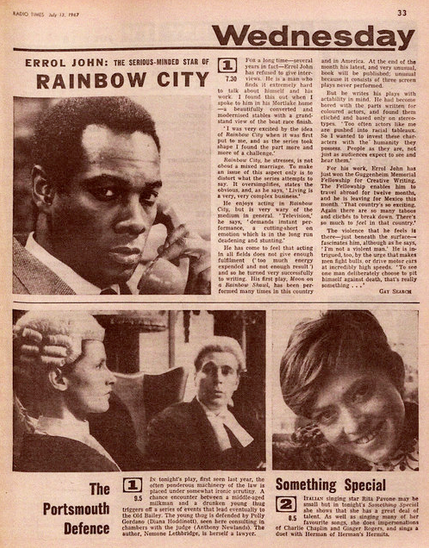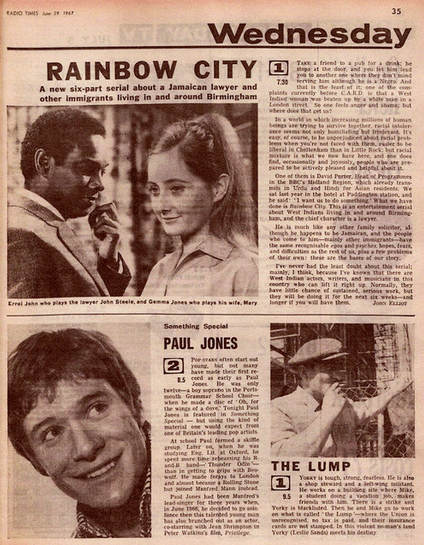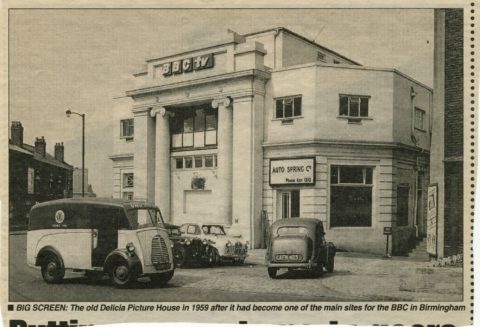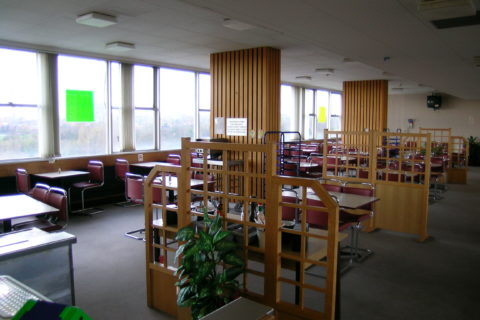
Copyright resides with the original holder, no reproduction without permission
The blog below is from academic researcher, Lez Cooke. It was posted on the Brum Pic website: http://www.brumpic.com/home-blog/2016/9/29/birmingham-on-film-gosta-green-revisited
Although BBC Television began broadcasting in the London area in 1936, television did not come to the Midlands until December 1949 when the Sutton Coldfield transmitter was opened. Initially television programmes transmitted in the Midlands came from London and it was not until late 1951 that TV programmes started to be produced by BBC Midland. Initially programmes were produced using an Outside Broadcast unit, which was shared between BBC Midland and BBC North, and one of the first outside broadcasts was an amateur boxing contest, live from the Delicia Stadium in Gosta Green. Four years later the Delicia Stadium, which had also been a cinema, was converted to become the first television studio in the Midlands.
Although plays were broadcast from the Birmingham Repertory Theatre in 1954-55 the first television drama to be produced at the Gosta Green studio was a half-hour play called Story Conference, performed by the Alexandra Repertory Company, which included Leslie Sands and Leonard Rossiter, making his first appearance on television. It was broadcast live on 13 March 1956. In fact, all plays were broadcast live from Gosta Green until 1960, when they started to be pre-recorded. The first full-length play to be broadcast from Gosta Green was The Miser by Moliere, adapted by Miles Malleson, on 19 July 1956. Albert Finney made only his second screen appearance in this and he was also in Willis Hall’s The Claverdon Road Job (27 August 1957), a play which was broadcast from the BBC’s Carpenter Road studios while Gosta Green was being re-equipped.
In 1959 a six-part adaptation of Arnold Bennett’s Hilda Lessways was broadcast, directed by Peter Dews, one of many productions he directed at Gosta Green from 1956-62, although Dews is probably best known for directing An Age of Kings (BBC, 1960), an adaptation of Shakespeare’s history plays for which he won a Bafta. The title role in Hilda Lessways was played by Judi Dench in one of her earliest television appearances and Eileen Atkins was also in the cast. Hilda Lessways was broadcast live and like most of the drama produced at Gosta Green it does not survive. Even the first pre-recorded drama from Gosta Green, Willis Hall’s The Larford Lad (20 May 1959), no longer exists, having been junked, or possibly wiped if it was recorded on videotape – the fate of much television drama from the 1950s through to the 1970s.
In fact, out of 781 plays and series episodes produced by BBC Midland at Gosta Green from 1956-71 only 38 survive, and 21 of these are episodes of the daytime serial The Doctors (1969-71). The earliest surviving play from Gosta Green is The Fanatics, written by Miles Malleson and broadcast on 13 March 1960. Nothing else survives until the first episode of Swizzlewick (18 August 1964), a 26-part serial about a Midlands town council, created by the Birmingham writer David Turner; the rest of the serial was wiped. Two episodes survive from The Flying Swan (March-September 1965), a serial set in a hotel on the River Thames. This was an attempt by the BBC to compete with ATV’s Crossroads (1964-88), which had started the previous year, but despite having Margaret Lockwood in a leading role The Flying Swan lasted for only 25 episodes. It was immediately replaced by United! (1965-69), a twice-weekly serial about a fictional Midlands football club (some of the exteriors were filmed at Stoke City FC) which ran for 147 episodes, but none of the United! episodes survive, the tapes being wiped to be reused for recording other programmes, such as The Newcomers (1965-69), a serial about a family who move out of London to a new town in the country. The Newcomers was broadcast from London from 1965-67 but production moved to Birmingham when United! ended. 430 episodes of The Newcomers were broadcast from Gosta Green, but only three survive.
Considering Gosta Green was just a small regional studio its television drama output was prolific. In addition to long-running serials such as United!, The Newcomers and The Doctors, which began immediately after The Newcomers ended, a number of original dramas were produced there in the 1960s. One of these was the six-part Rainbow City (May-August 1967), five episodes of which have survived. Created by John Elliot, who also wrote, produced and directed several of the episodes, three of which he co-wrote with associate producer Horace James, who also had a leading role in the drama, Rainbow City was about a West Indian lawyer, John Steele (Errol John), and the people he represents, all of whom are from Birmingham’s immigrant communities. Much of the series was filmed in Birmingham, although it also features some scenes filmed in Jamaica when Steele returns to his home country on a visit. There is a subplot involving Steele’s English wife, Mary (Gemma Jones) and their young daughter, who Mary agrees, in the final episode of the series, should go to live with her grandparents in Jamaica in order to experience both her parents’ cultures. Rainbow City was the first British television series to feature a predominantly black cast and the depiction of an inter-racial marriage was quite progressive for the time.
The three-part Packers End (March-April 1968) also dealt with racial issues, featuring a Jewish youth worker who decides to leave London to take up a new job in Birmingham. The serial was shown as a regional opt-out and only the first episode survives. Sinking Fish Move Sideways (5 August 1968) was a half-hour drama, essentially a two-hander, which was shown as part of a short series called Television Theatre From … This was also a regional opt-out and the surviving copy shows that even a drama which was not networked was produced to a very high standard at Gosta Green. In 1969 seven plays were produced at Gosta Green for the series Plays of Today, including Scenes from Family Life (25 September 1969) by Barry Bermange and A Voyage Around My Father (16 October 1969) by John Mortimer, both of which survive, though the others in the series do not. There was also a drama documentary about the poet John Clare, featuring Freddie Jones, which was shown as part of the Omnibus arts series on 5 February 1970 – this also survives.
Gosta Green’s drama production ended on 17 June 1971 with the final episode of The Doctors, episode 162. The BBC’s television drama production in Birmingham moved to the new Pebble Mill studios, along with many of the people who worked at Gosta Green, and a new era of drama production began in Birmingham. While much of the drama produced at Pebble Mill has been rightly celebrated, the considerable output of Gosta Green has been largely forgotten, perhaps because so little of it has survived.
On Saturday 15 October 2016, three of the dramas produced at Gosta Green – the first episode of Rainbow City, an episode of The Newcomers and Sinking Fish Move Sideways – will be screened as part of a tribute to this pioneering regional television studio, sixty years after drama was first produced there.
Lez Cooke (Honorary Research Fellow, Royal Holloway, University of London and Co-Investigator on the AHRC-funded project, The History of Forgotten Television Drama in the UK)
Save





